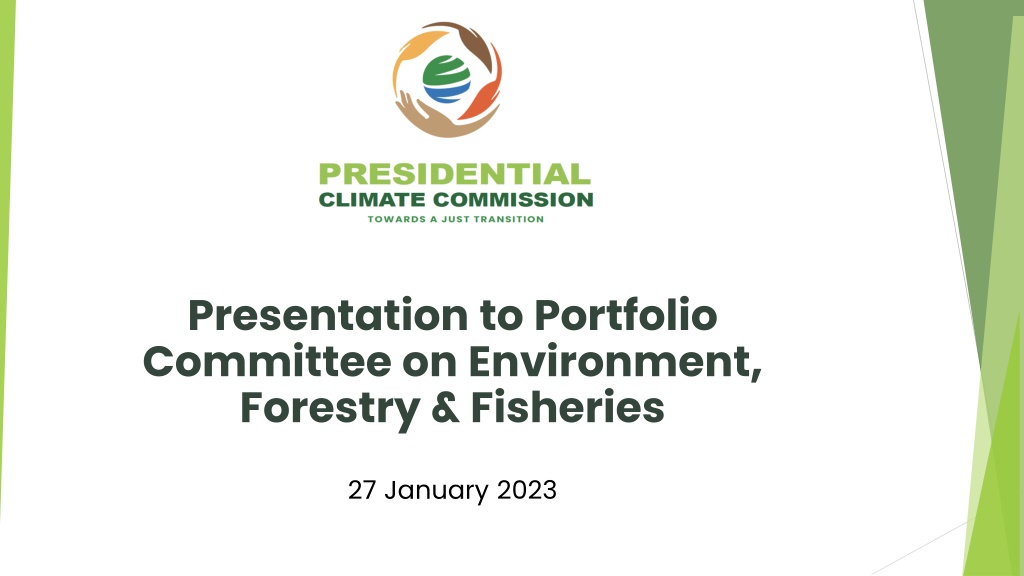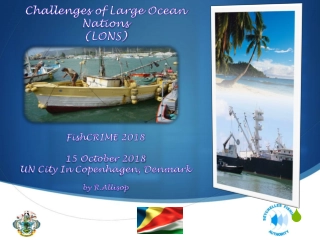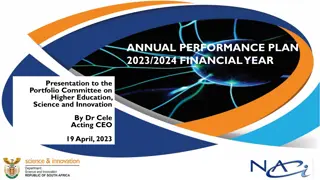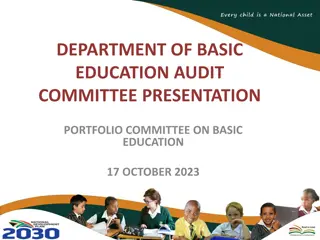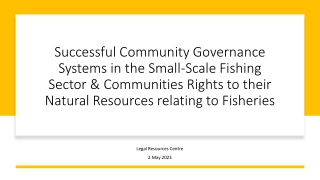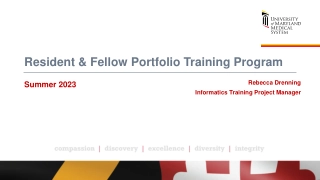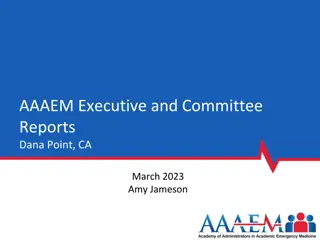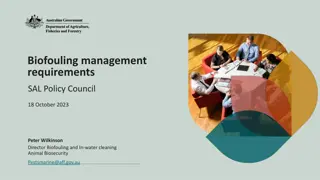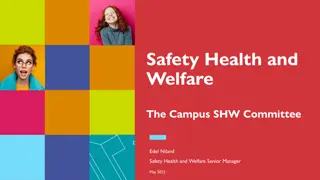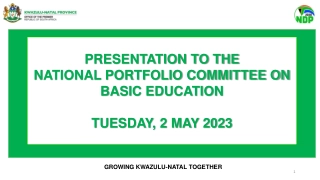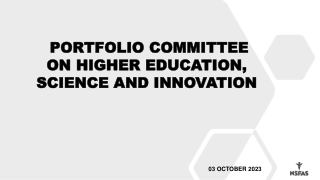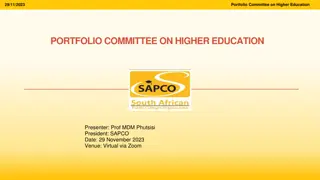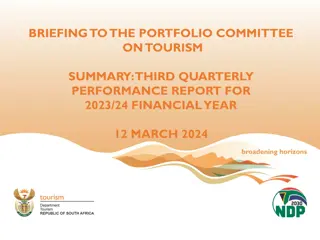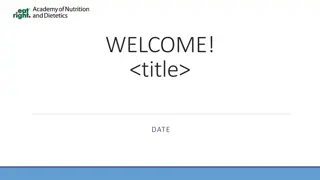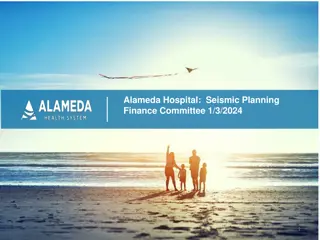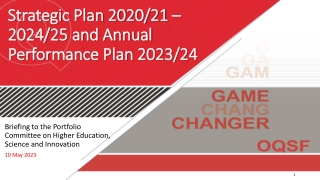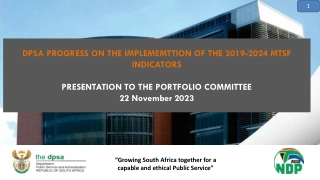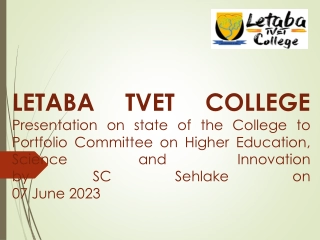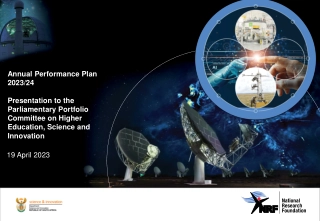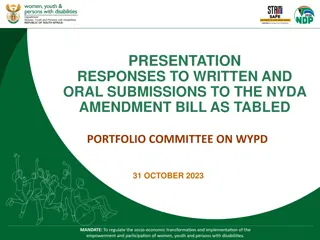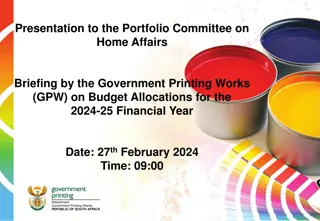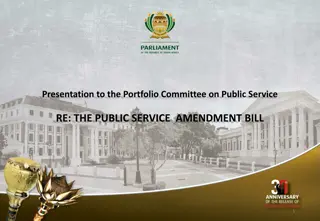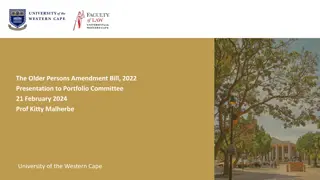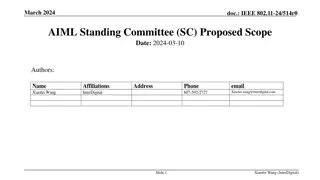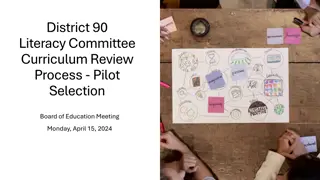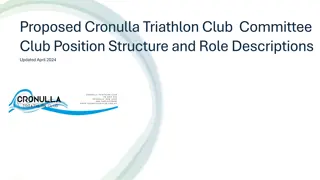Presentation to Portfolio Committee on Environment, Forestry & Fisheries
The presentation highlights the establishment and functions of the Presidential Climate Commission (PCC), focusing on the country's climate change response and transition to a low-carbon, climate-resilient economy. It emphasizes research, stakeholder consensus, and policy influence towards ecological sustainability. The PCC's work aligns with key government processes to achieve sustainable development goals and implement the Just Transition framework, promoting social inclusion and poverty eradication.
Download Presentation
Please find below an Image/Link to download the presentation.
The content on the website is provided AS IS for your information and personal use only. It may not be sold, licensed, or shared on other websites without obtaining consent from the author. Download presentation by click this link. If you encounter any issues during the download, it is possible that the publisher has removed the file from their server.
- Climate Change Response
- Just Transition Framework
- Sustainability
- Presidential Climate Commission
- Environmental Policy
Presentation Transcript
Presentation to Portfolio Committee on Environment, Forestry & Fisheries 27 January 2023
Introduction PCC was mooted in the Presidential Job Summit Framework Agreement in October 2018. Commission appointed by President in December 2020 based on Cabinet decision Purpose is to independently advise on the country s climate change response and pathways to a low-carbon, climate-resilient economy and society Commission consists of 12 Ministers and 26 Commissioners appointed on the basis of nominations from social partners. Climate Change Bill to be considered by Parliament includes provisions for Commission as permanent statutory body
What we do - PCCs main functions Research & information Ensure scientific evidence base for recommendations and better decision making by social partners Forge consensus between diverse stakeholders to build support for policy and action required for a just transition Build consensus Influence policy, promote sustainable economic change, and provide advice where action falls short. Enable action
Shift towards low carbon, climate resilient and ecologically sustainable economy and society which contributes to the goals of decent work for all, social inclusion, and the eradication of poverty Three different elements of justice to consider: Procedural inclusivity in decision-making Distributive distribution of resources in society Restorative compensation for impacted groups PCC developed a JT framework as a practical guide for stakeholders in implementing the Just Transition and it indicates the short to medium term policy interventions. The PCC is now working towards the development of the implementation plan, which will be done in consultation with implementers. Just transition is overarching focus
PCC work complements key government processes The PCC exists to provide independent advice which may complement work of line agencies DFFE DMRE Mitigation Potential Analysis IRP update Updated NDC (to 2030 and 2030 to 2035) IEP update Updated LEDS Gas Master Plan Support Carbon Budgeting (SETS) Enhanced Ambition Ministerial Round Table DoT and DPME SRJP Green Transport Strategy NT National, Provincial and Carbon Tax Local Strategic Planning Green and Transition Taxonomy The Just Transition Sustainable Finance Technical Paper Transaction Net-zero Economic Modelling. DMRE JT Framework DTIC COGTA Local and provincial government panning Industry Master Plans and capacity building As well as specifically impacted local government, for example in Mpumalanga
PCC at COP 27 - Egypt 2023 SCHEDULE OF EVENTS Day 3: Wednesday, 9 November 2022 (Finance Day) Title: Financing the Just Transition in South Africa: A COP Dialogue Session 1 Host: Presidential Climate Commission (PCC) Time: 09:00 to 10:30 Day 6: Saturday, 12 November 2022 (Adaptation & Agriculture Day) Title: Adaptation as a Key Driver of the Just Urban Transition Session 1 Host: Presidential Climate Commission (PCC) Time: 09:00 to 10:30 Day 9: Tuesday, 15 November 2022 (Energy Day) Title: Competing Narratives in SA s Energy Transitions Session 5 Host: Presidential Climate Commission (PCC) Time: 14:30 to 16:00 Day 11: Thursday, 17 November 2022 (Solution Day) Title: Developing M&E for a Just Transition Session 1 Host: Presidential Climate Commission (PCC) Time: 09:00 to 10:00
Mitigation event discussed in depth the future of energy globally and locally Key Points: Future competitive economies are zero-carbon Even accounting for short term demand fluctuations resulting from the war in Ukraine medium term demand for fossil fuels is flat or down under existing policy measures If countries met their commitments this demand is significantly down Energy systems need to rapidly transition to least cost renewable based systems Participant Facilitator, Steve Nicholls, PCC Topic Welcome and introduction Erwin de Nys, World Bank global The South African CCDR in the context of global CCDR efforts Mr Tim Gould, Chief Energy Economist, International Energy Agency Global narratives on energy transition and insights from WEO 2022 James McKay, CEO SA Energy Council Andre de Ruyter, CEO Eskom Joanne Yawitch, NBI, NPC and JET-P Secretariat Hlengiwe Radebe, WWF South Africa Facilitated Panel Discussion followed by audience Q&A Crispian Olver, PCC Summary and Closure
The PCC Mitigation work is therefore focused on Understanding least-cost, secure energy transitions and their impact on economic competitiveness We have hosted 7 events in the last quarter building critical knowledge on energy systems in transition (available on our website) We will be hosting 10 stakeholder sessions during February and March focussing on our energy recommendations and the JET-IP We will collate the feedback from these event into a recommendations paper on behalf of commissioners to the President and Cabinet Understanding the impact of net-zero transitions on each sector of the South African economy and the steps we need to take to remain competitive Building the capacity of the modelling community to generate relevant supporting data and information, including at a provincial scale, and building the capacity of economic planers to use this data Developing alternate employment opportunities in Mpumalanga and other regions most impacted by climate transitions
Energy transitions are the critical first step Pro-climate, pro-renewable pathways are pro- poor Concerns centered on energy security of renewables and therefore the need for baseload are unfounded Study after study determine the long-term energy mix to be comprised of renewables, storage and peaking support There is an energy crisis, and we need to implement urgent short-term interventions, but that optimal short-term solutions are also renewable based The short-term plan is grid constrained and therefore needs to be location based, maximizing the existing grid connections This short-term planning also then gives direction to the JET-IP But we need to focus on every possible means of improving security We need to simultaneously: Base all work in the Just Transition Develop a short-term (2028) spatial based electricity plan, aligned with the JET-IP. This will get renewables on the grid as quickly as possible. The only technologies we get on quickly enough are renewables, storage and peaking gas support. Improve EAF as much as possible Set up independent transmission company and invest in grid expansion Work with public and private stakeholders to drive Energy Efficiency Get us much new generation on the grid as possible
Reflections on COP 27 - Adaptation Agreement on the setting up of a Loss and Damage Fund Most parties were positive on the discussions on the Global Goal on Adaptation, but little movement by way of formal agreements and new funding. The discussions outside the negotiations were vibrant, including the SA-led Adaptation dialogues in both the SA Pavilion and the China Pavilion
Strategic Approach for PCC on Adaptation Knowledge Support Climate RDI Roadmap Building agency in Social Partners Institutional Agency eg. Cities Support Project Climate Resilience Development Pathways Climate Resilient Development Catalytic and co-ordinating Partner Agency, jobs and Enterprises Facilitate local and international partnerships New CC empowering Protocols for Disaster Management Accelerate implementation of NCCAS
Focus for 2023 Adaptation Launch of the PCC papers on the KZN Floods and the Gqeberha Drought focusing on Climate emergencies and preparedness. Sectoral Climate Resilience -> Gap Analysis projects in 3 pivotal sectors : Agriculture, Water & Built Environment Empowering the Just Urban Transition with a combination of the next phase of the Cities Support Programme A special focus on Climate Resilience in Mpumalanga Foundations work on Climate Adaptation resourcing Developing International Adaptation Partnerships with ICCN Adaptation Working Group and the global Locally Led Adaptation Action Coalition
The PCCs climate and transition finance role is built on addressing this challenge Enabling the flow of funds Mobilising climate finance Monitoring & evaluating capital flows
PCC Climate Finance Strategy and Plan 1. A coherent understanding and approach to Climate Finance: A PCC internal concept note to guide advice and endeavors to mobilize and scale up climate finance for mitigation and adaptation 2. A strategic plan to implement the PCC s role in mobilizing and scaling up climate finance
Designing a Just Transition Financing Mechanism 1. The social and justice components of the just transition require special means to finance them 2. The existing financial ecosystem is not geared to provide resources to pure just transition programmes and projects 3. Adaptation finance is a challenge 4. Creative approaches are required to ensure that negative impacts of mitigation are ameliorated for different options and trade-offs to meet both decarbonisation outcomes and economic development objectives
Climate finance Landscape and Tracking Flows Approximately $2.4bn per year, mainly towards mitigation and clean energy (81%) Adaptation makes up only 7% of funds, with a further 13% dual benefit. Very limited contribution to just transition Primarily debt, equity and concessional debt limited grants Historic scale of access inadequate for the scale of climate response A biennial analysis of macro climate-related financial flows in South Africa tom inform future policy and climate- related interventions Chart source: CPI, Green Cape et al, Climate-Finance- Landscape-2020
Outreach and Communications 1. SECTORAL CAMPAIGNS AND STAKEHOLDER RELATIONS Raise awareness on the science of climate change; its impacts and the opportunities of a just transition . Educate, inform and mobilize through outreach campaigns to ignite collective action . 1. Development of Q1 Stakeholder Engagement Plan - Energy Plan, JET-IP and JTF Implementation 2. Mobilisation Campaign through Arts, Essays and Youth Engagement 3. Increased consultation of affected and impacted communities 2. WORKING WITH THE MEDIA Seek platforms to strengthen collaboration, in pursuit of building a national brand for climate action . 1. Media Engagement and Capacity Building Q1 of 2023 2. Capacity Building for Community Radio including targeted programmes co-funded with donors 3. DIGITAL MEDIA AND CONTENT DEVELOPMENT 1. Website and Digital Platforms Development ( FB, Twitter, Web, LinkIn . 2. Zero-Rating ( Data Free) content on platform to increase access to online engagements 3. Accessibility of PCC reports-local language translation Share climate stories, produce credible science- based reports and promote climate initiatives.
Monitoring, Reporting & Accountability Climate Change Bill will formalise legal status of PCC and institutionalise reporting and accountability For time being, PCC reports to Presidency and Ministers for DFFE and DPME PCC will report to Parliament on an annual basis via Minister DFFE, and PCC plans to be included in Minister s budget speech PCC annual report April 2023 PCC is building systems to enable critical evaluation of progress with climate transition, and is collaborating with DFFE and DPME to avoid duplication of effort
Thank you Email: thuli@climatecommission.org.za For further information www.climatecommission.org.za
